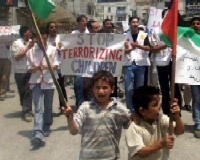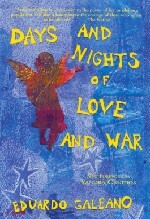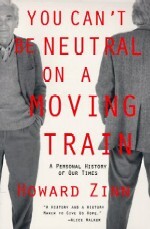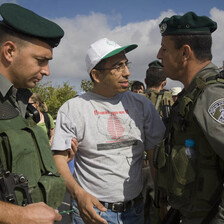
REUTERS/Abed Omar Qusini
I don’t read the newspapers, they don’t give me news, only opinions or versions. Days I speak with people who lost their will to fight, their spirit, their anger, it seems that curfews take a heavy toll. Eventhough ‘the situation’ was far more worse in February and March, I still had loads of energy and an enormous will to struggle against injustice. ‘What happened to you?’ Ala asks again. I don’t really know, I can only guess.
‘So how are you doing?’ I asked Ala. ‘I’m fine, actually, despite the curfew I am walking through the old city’. He sounded so excited. ‘We organised a demonstration together with thirty international volunteers. Residents of Nablus who were confined to their homes were encouraged and they joined the demonstration. We were mobilizing the old city and the crowd grew larger and larger’. He said that walking through the old city is one of his favourite activities. ‘I spoke about our heritage, history and our resistance’.
‘I was worried about the Israeli tanks but we were moving carefully. We used our mobiles to check every corner of the street. Fortunately, there were no Israeli soldiers. The curfew is still imposed on us’. Ala is alive. He said that the fact that he is alive gives him reason to be happy.

‘I pursue the enemy voice that has ordered me to be sad. At times I feel that joy is a crime of high treason, and I am guilty of the privilege of being alive and free’.
‘To be alive: a small victory. To be alive, that is: to be capable of joy, despite the good-byes and the crimes, so that exile will be a testimony to another, possible country. The task ahead – building our country – cannot be accomplished with bricks of shit. Will we be of any use if, when we return, we are broken?’
Recently I am forced only to look for small lights. Last week we managed to release a Palestinian detainee. He was in administrative detention. His 17 months old son, Munjid, was due to receive a section of his father’s liver in a life-saving transplant operation in the United Staes. Medical reports stated that receiving a section of his father’s liver was Munjid’s only chance of survival. Finally on Friday morning, Hanan ran into my room and said: ‘they released him!’
The day before she was in touch with the Israeli attorney general, the military court, and we were in touch with Amnesty International, which sent out an urgent appeal. Shahir, the father, was arrested on April 9, during the invasion of the old city of Nablus. On April 23, he received an order for three months in administrative detention in Ansar III, which is located in a closed military zone in the Negev desert, not far from the Egyptian border. Ansar III, which was established in March 1988, four months after the beginning of the previous intifada, was recently re-opened. The location of this detention center has, from the beginning, raised serious concerns. Almost immediately after its establishment, Ansar III gained notoriety as a detention center where conditions of internment were so harsh as to constitute a form of punishment in and of themselves.
Shahir Mansur, a Palestinian police officer, was arrested on 9 April during the Israeli Defense Forces’ invasion of the old city of Nablus. Two weeks later, he received an order for three months in administrative detention, which is a procedure under which detainees are held without charge or trial for a specified period. No criminal charges are filed, and the authorities have no intention of bringing a detainee to trial. The detention order can be frequently renewed on or before the expiry of the detention period. This process can be continued indefinitely. There are currently over one thousand Palestinians in administrative detention.
Lately, I hardly read the news. Any correspondent who still has to proof to himself that he is ‘objective’ is embarrassing himself. Howard Zinn, activist, historian, writer and teacher, once said that objectivity is neither possible nor desirable. It’s not possible because all journalism is a selection out of an infinite number of facts. As soon as the journalist begins to select, he selects according to what he thinks is important. Therefore it is already not objective. It’s already biased in the direction of whatever he, as the selector of this information, thinks people should know.
The worst thing is to claim to be objective. Journalists or correspondents should make it explicit what their values are, what they care about, what their background is, and let the reader know what is important to them so that whoever reads their articles are warned in advance. Therefore, it is not possible to be objective, and it is not desirable if it were possible.
Yes, I read about the fear of Israeli citizens, their worsened economy, and whatever journalists find important. That is why CNN has a special section on the Israeli victims of terror and not on Palestinian victims of (state) terror. That is why Fox News seems to be popular, it takes sides, it shows its affiliation, it is part of the war.
Journalists drown themselves with self-justification, disparagement of critics and nearly non-existent substantive inquiry about issues raised. They are criticised for ‘less well providing context’, but does the average correspondent indeed know the context, and is the context he provides not biased in the first place? No, reading the news is not something that excites me these days.
‘But how can you stay optimistic?’ is a common question asked. ‘What keeps you doing your work?’ There are some writers who have explained what is it what motivates people. One of them is Howard Zinn. Anyone who feels frustrated needs to read his book ‘You Can’t Be Neutral on a Moving Train’.

‘I said I could understand being depressed by the state of the world, but the questioner had caught my mood accurately. To him and to others, mine seemed an absurdly cheerful approach to a violent and unjust world. But to me what was often disdained as romantic idealism, as wishful thinking, was justified if it prompted action to fulfill those wishes, to bring to life those ideals. The willingness to undertake such action cannot be based on certainties, but on those possibilities glimpsed in a reading of history different from the customary painful recounting of human cruelties. In such a reading we can find not just war but resistance to war, not just injustice but rebellion against injustice, not just selfishness but self-sacrifice, not just silence in the face of tyranny but defiance, not just callousness but compassion.’
He said that history is full of instances where people, against enormous odds, have come together to struggle for liberty and justice, and won, ‘not often enough, of course’, but enough to suggest how much more is possible.
He continues:
‘The essential ingredients of these struggles for justice are human beings who, if only for a moment, if only while beset with fears, still step out of line and do something, however small. And even the smallest, most unheroic of acts adds to the pile of kindling that may be ignited by some surprising circumstance into tumultuous change’.
There are writers who provides you with an insight, an understanding and hope. However, he proofs that it is not just wishful thinking but that it has been proven all through history.
Perhaps you thought I would write about ‘the situation’, there is so much to write. Yet, people around me project their moods which are not optimistic. Howard Zinn points to the fact how often in this past century we have been surprised by the sudden emergence of a people’s movement, the sudden overthrow of a tyranny, the sudden coming to life of a flame we thought extinguished.‘We are surprised because we have not taken notice of quiet simmering of indignation, of the first faint sounds of protest, of the scattered signs of resistance that, in the midst of our despair, portend the excitement of change. The isolated acts begin to join, the individual thrusts blend into organized actions, and one day, often when the situation seems most hopeless, there bursts onto the scene a movement’.
Zinn tells us that we are surprised because we do not see that ‘beneath the surface of the present there is always the human material for change: the suppressed indignation, the common sense, the need for community, the love of children, the patience to wait for the right moment to act, in concert with others’.
He explains that people are practical, that they want change but feel powerless, alone, that they do not want to be the blade of grass that sticks up above the others and is cut down.‘They wait for a sign, from someone else who will make the first move, or the second. And there are intrepid people who, at certain times in history, take the risk, that if they make that first move others will follow quickly enough to prevent their being cut down. And if we understand this, we might make that first move’.
Thanks to extraordinary persons like Howard Zinn or Eduardo Galeano, who truly understand history, we are enabled to understand and know to move on.
- the picture shows two Palestinian boys carry flags in front of peace demonstrators in Nablus on July 12, 2002, during a protest against the curfew imposed by the Israeli forces in the West Bank (REUTERS/Abed Omar Qusini).




